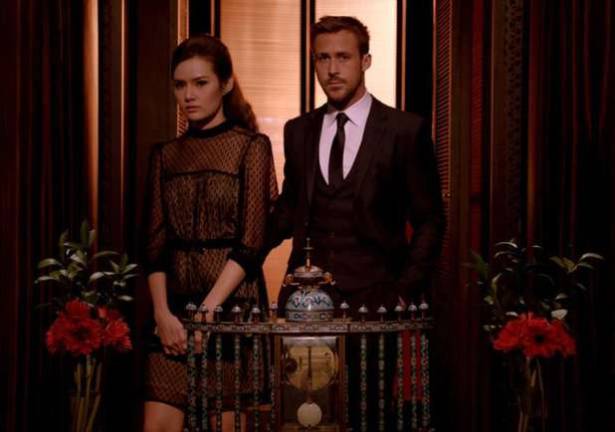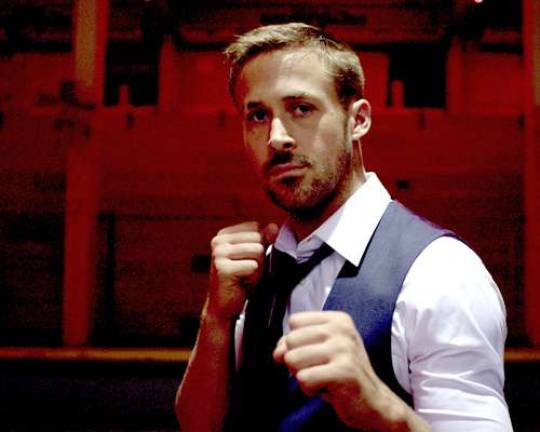Ryan and Nick Meet Leo and Marty


Only God Forgives is a decadent drag act
Ryan Gosling plays DiCaprio to Nicholas Winding Refn's Scorsese--acting out an adolescent idea of manliness in Drive and now Only God Forgives. But sulky Gosling lacks DiCaprio's hammy brio just as Refn lacks Scorsese's flamboyance, so he mopes and broods; practicing a weak swagger amidst Refn's brutal, grotesque, nihilistic stagings
Refn was praised for the derivative noir style of last year's Drive so why not try to get away with it again? But sicker and darker this time? In Only God Forgives, Refn imitates the Asian noir of schlockmeister Park Chan Wook (Oldboy) in this story of a ruthless Bangkok gangster Chang (Vithaya Pansringarm) waging battle with an American-boy reprobate: Julian (Gosling) is determined to avenge his sadistic brother's death, egged on by his dragon lady mother, Crystal (Kristin Scott Thomas).
Like Drive, Refn repeats that neo-noir tendency for atrocity. Vengeance goes unexamined as psychology, it's merely an opportunity for outre gore and repugnant spectacle. By scene three of Only God Forgives, the sight of one man's cut-off arm, a slaughtered prostitute and Julian's brother so beaten to death his blood is splattered across the room of a flophouse, our trust in life, morality and pop art is completely undermined. (Refn snarkily caps the sequence with Chang's karaoke performance.) The cutthroat underworld Refn creates (where Western Caucasians are free to indulge an implied Eastern disrespect for life) is so exaggerated, feverish and slick you either laugh at it or fall for it.
The humorless appeal to adolescent taste ultimately infects Refn's concept of heroism. Though Julian sometimes has psychic visions of dismemberment, he displays a catatonic chic. His confrontation with Chang is spoken with schoolkid childishness: "Wanna fight?" is an attempt at conveying innocent depravity. Such stupidity must strike Refn and his fans as cool. Given the film's pervy, incestuous teases, Gosling is like a little boy wearing Mommy's dress, necklace and high-heels. And director Refn is his playmate. Each of Gosling's Refn's roles is a drag act in which he strikes poses too grown up for his callow brooding and too silly for Refn's overwrought style. A truly cool actor might wink at Refn's conceits but Gosling plays at intensity and mysterious depth that seem borrowed cool--and it is a drag. (Scott Thomas beats star and director at their game: her decadent, racist matriarch is the damnedest impersonation of Ellen Barkin.)
This nonsense is so inorganic to any sense of globetrotter restlessness or anything explicitly or metaphorically to do with British or American colonialism that it just feels derivative. That Kubrickian scene in Drive of dead-eyed strippers watching an assault gets extended here in a more elaborate whorehouse sequence where catatonic hookers bear mute witness to scenes of their government's corruption. Refn's tableau of organdy-gowned call-girls listening to pop while watching military corruption as in a bouquet-bedecked whorehouse is the ultimate David Lynch parody.
Gosling and Refn have art ambitions--a strange sense of fun. But how can film culture progress with fantasies like this? There's no shock or outrage left. Refn relies upon a level of menace (unerotic, non-provocative) that precludes caring about or responding to violence, vulnerability, mortality. This is cinema for unsophisticated viewers who don't already know Bunuel's eye slashing, Altman's Coke bottle assault or Shakespeare/Julie Taymor's Titus. Children of Kubrick, Friedkin, Lynch and Tarantino, they know nothing.
Follow Armond White on Twitter at 3xchair